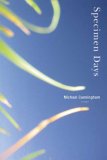Summary | Excerpt | Reading Guide | Reviews | Beyond the Book | Read-Alikes | Genres & Themes | Author Bio

Critics' Opinion:
Readers' Opinion:
First Published:
Jun 2005, 320 pages
Paperback:
Apr 2006, 352 pages
Please be aware that this discussion guide will contain spoilers!
About This Guide
The following author biography and list of questions about
Specimen Days are intended
as re-sources to aid individual readers and book groups who would like to learn
more about the author and this novel. We hope that this guide will provide you a
starting place for discussion, and suggest a variety of perspectives from which
you might approach
Specimen Days.
About This Book
Specimen Days, the much anticipated follow-up to Michael Cunningham's
award-winning inter-national bestseller
The Hours, reconfirms the
author's daring imagination and storytelling gifts. Comprised of three
thematically linked novellas,
Specimen Days is both
inspired by, and an homage to, American visionary poet Walt Whitman. The first,
"In the Machine," is a ghost story at the height of the industrial revolution;
the second, "The Children's Crusade," is a con-temporary crime thriller about a
kids' terrorist ring; and the third, "Like Beauty," is an inter-species romance
circa 2150. Provocative, entertaining, and unexpectedly moving,
Specimen Days is, as
The New York Observer
states, "an extraordinary book, as ambitious as it is generous."
Discussion Questions
For more information on Picador Reading Group Guides: Call: 646-307-5629. Fax: 212-253-9627. E-mail:
readinggroupguides@picadorusa.com. For a complete listing of reading group guides visit:
www.picadorusa.com.
Unless otherwise stated, this discussion guide is reprinted with the permission of Picador. Any page references refer to a USA edition of the book, usually the trade paperback version, and may vary in other editions.




Censorship, like charity, should begin at home: but unlike charity, it should end there.
Click Here to find out who said this, as well as discovering other famous literary quotes!
Your guide toexceptional books
BookBrowse seeks out and recommends the best in contemporary fiction and nonfiction—books that not only engage and entertain but also deepen our understanding of ourselves and the world around us.